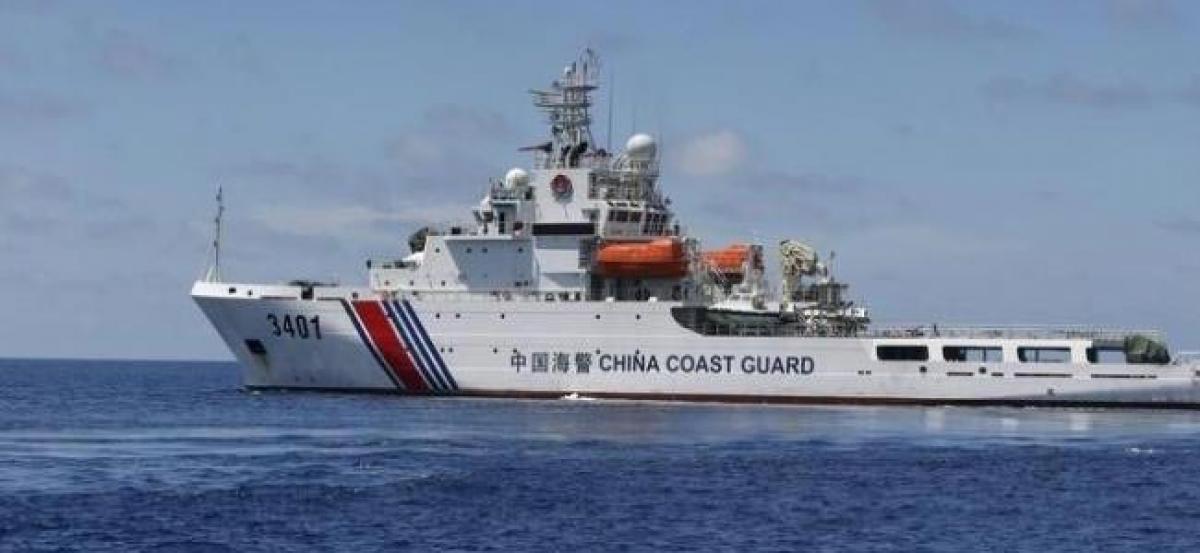Live
- Six Useful Strategies to Control Your Heart During the Pollution Season
- Phalodi Satta Bazar Predicts Close Race in Maharashtra Assembly Election 2024
- Federer Pays Heartfelt Tribute to Nadal Ahead of His Retirement: "An Epic Career"
- Odisha holds successful mega investors roadshow in Singapore
- PGTI Tour: Top stars to fight for honours in Servo Masters Golf
- SC upholds termination of LIC employee for absenting himself without intimation
- ‘Stone me or shoot me, won’t spare anyone,’ says Anil Deshmukh after discharge
- Siddaramaiah, Shivakumar turning Karnataka into Pakistan: K’taka BJP
- Zimbabwe records 70 suspected cholera cases, one death amid new outbreak
- Babri demolition day: No Assembly proceedings in Bengal on Dec 6
Just In

Increasingly assertive action by China\'s coast guard ships in the South China Sea risks destabilising the region, according to the authors of new research tracking maritime law enforcement incidents across the vital trade route.
Increasingly assertive action by China's coast guard ships in the South China Sea risks destabilising the region, according to the authors of new research tracking maritime law enforcement incidents across the vital trade route.
While the risks of full-blown naval conflict dominates strategic fears over the disputed waterway, the danger of incidents involving coast guards should not be underestimated, said Bonnie Glaser, a regional security expert at Washington's Center for Strategic and International Studies think tank.
China claims much of the South China Sea, which carries the bulk of Northeast Asia's trade with the rest of the world. Vietnam, the Philippines, Malaysia, Brunei and Taiwan also have claims.
CSIS researchers have detailed some 45 clashes and standoffs in the South China Sea since 2010 in a survey published on its ChinaPower website on Wednesday. (here)
While the research includes clashes between a variety of regional states and types of vessels, the actions of China's coast guard dominates the picture. China's coast guard has been involved in 30 of the cases logged, two-thirds of the total. Four other incidents involved a Chinese naval vessel operating in a law enforcement capacity.
"The evidence is clear that there is a pattern of behaviour from China that is contrary to what law enforcement usually involves," Glaser told Reuters.
"We're seeing bullying, harassment and ramming of vessels from countries whose coast guard and fishing vessels are much smaller, often to assert sovereignty throughout the South China Sea."
The research includes the violent maritime stand-off between Beijing and Hanoi over the placement of a Chinese oil exploration rig off the Vietnamese coast in 2014, as well as tensions that led up to China's occupation of the Scarborough Shoal off the Philippines in 2012.
It is being published as Chinese coast guard and other vessels return to Scarborough Shoal, sparking formal diplomatic protests from Manila. The Philippines said on Wednesday it was seeking clarification from China about the increase in ships near the shoal.
China's State Oceanic Administration, which oversees the coast guard, did not respond to requests for comment on the research.
Chinese Foreign Ministry spokeswoman Hua Chunying said she believed it was natural for China's coast guard vessels to legally carry out patrols and maintain maritime order in waters under China's jurisdiction.
"We hope the relevant individuals can stop hyping up this kind of information, and stop sowing discord and tension," she told a daily news briefing in Beijing.
The research defines an incident where a nation's coast guard or navy has used coercive measures beyond routine law enforcement action.
In the short term, Glaser said she believed the risk of injury or death could be worse in civilian clashes than among navies patrolling the South China Sea, given the frequency and intensity of incidents in recent years.
Encounters by rival coast guards are not yet covered by expanding communications arrangements that are geared to preventing clashes between the region's naval forces.
The survey cites research showing the unifying of China's civilian maritime fleets in 2013, coupled with on-going budget increases, has given it the world's largest coast guard.
It now deploys some 205 vessels, including 95 ships over 1,000 tonnes, according to the U.S. Office of Naval Intelligence - a far larger fleet than other regional countries, including Japan.

© 2024 Hyderabad Media House Limited/The Hans India. All rights reserved. Powered by hocalwire.com







